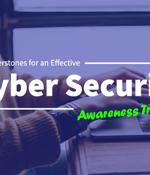Security News

Phishing, educating your employees, and creating a cyber awareness culture? These are topics we're sensitive to and well-versed in. We've repeatedly seen that ad hoc, scattershot employee training attempts don't work.

In this interview for Help Net Security, Mark Ruchie, CISO at Entrust, talks about cloud security and how zero trust should be implemented to guarantee overall cloud protection. Generally speaking, the best way for an organization to approach zero trust is for security teams to take the mindset that the network is already compromised and develop security protocols from there.

CSC released its third annual Domain Security Report that found three out of four Forbes Global 2000 companies have not adopted key domain security measures-exposing them to high risk of security threats. Not deploying any of the recommended domain security measures puts these companies at risk for a variety of attacks, including but not limited to domain and DNS hijacking attacks, network and data breaches, phishing and ransomware attacks, and business email compromise.

You will also receive a complimentary subscription to TechRepublic's News and Special Offers newsletter and the Top Story of the Day newsletter. You may unsubscribe from these newsletters at any time.

Despite massive spend to protect enterprise digital assets, security breaches are still on the rise. The disconnect between the level of investment and the volume and impact of attacks is largely attributed to outdated approaches that favor perimeter protection and point solutions despite a digital supply chain that is more distributed than ever.

The U.S. Federal Communications Commission formally announced it will no longer authorize electronic equipment from Huawei, ZTE, Hytera, Hikvision, and Dahua, deeming them an "Unacceptable" national security threat. All these Chinese telecom and video surveillance companies were previously included in the Covered List as of March 12, 2021.

The U.S. Federal Communications Commission formally announced it will no longer authorize electronic equipment from Huawei, ZTE, Hytera, Hikvision, and Dahua, deeming them an "Unacceptable" national security threat. All these Chinese telecom and video surveillance companies were previously included in the Covered List as of March 12, 2021.

Webinar Email provides us with an infinite number of possible exchanges. We send approximately 332 billion messages a day but having so much convenience and flexibility at our fingertips also brings security risks.

In this Help Net Security video interview, Eric Leblond, CTO at Stamus Networks, talks about The Security Analyst's Guide to Suricata, a book he co-wrote with Peter Manev. The Security Analyst's Guide to Suricata is not meant to replace the user guide but was written to offer additional support for the security practitioner.

PCI compliance is a structure based on requirements mandated by the Payment Card Industry Security Standards Council to ensure that all companies that process, store or transmit credit card information maintain a secure operating environment to protect their business, customers and confidential data. The PCI SSC was created by Visa, MasterCard, American Express, Discover and Japan Credit Bureau to administer and manage the PCI DSS. Companies which adhere to the PCI DSS are confirmed PCI compliance and thus trustworthy to conduct business with.